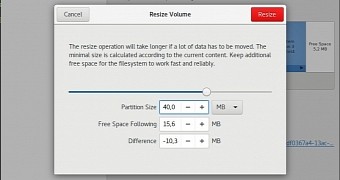GNOME's Disks utility (gnome-disk-utility) is getting a lot of attention from its maintainers during the development cycle of the GNOME 3.26 desktop environment, and it now looks like there will be new disk resize and repair functions, too.
We already reported at the end of May on many of the new features coming to Disks 3.26, which should hit the streets on September 13, 2017, as part of the GNOME 3.26 release, and now, developer Kai Lüke reveals the fact that he's working on implementing the ability to resize partitions and their filesystems, as well as to check filesystems and repair them.
"Offering a file system resize where the block device can’t be fitted is a strange experience because it’s in general impossible to tell up to which size a file system occupies space in this block, meaning the result would look the same except for a difference in free space. Thus for the beginning, only filesystems in partitions are resizable," said Kai Lüke in his latest blog article.
The developer also plans to improve NTFS support, and FAT file system resize support, and the latest development version of GNOME Disks, version 3.25.4, was released last week as part of the GNOME 3.25.4 desktop to enable large file support, as well as to update the window for power state changes, along with various bug fixes and updated translations.
Disks 3.25.4 is available for testing today
Among other highlights of the major Disks 3.26 release, we can mention the ability to prompt the user to stop any running jobs when closing the app, better support for probing and unmounting of mounted volumes, implementation of hints for passphrase fields, an App Menu entry to ease the creation of an empty disk image, and the ability to display UUIDs for selected volumes.
Also worth mentioning is that the meaning of the encryption and mounting options were clarified for new users and the unused "Erase Disks" dialog was removed. Disks 3.25.4 is available for testing today if you download the source tarball through our web portal and compile it on your favorite GNU/Linux distribution. Please note that this is an unstable version, so don't use it for any production work.

 14 DAY TRIAL //
14 DAY TRIAL //